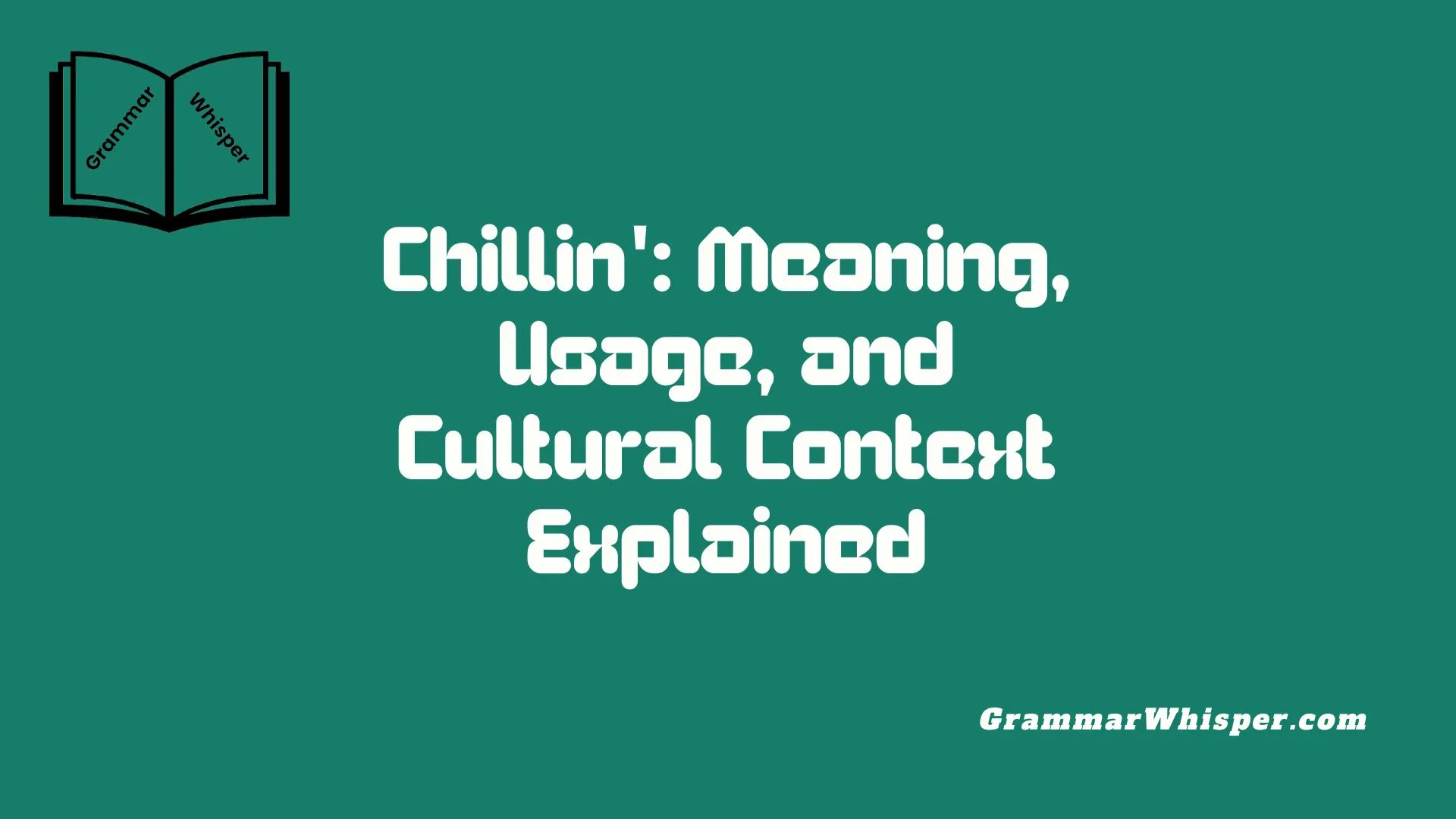Having real understanding of the word chillin’ makes me see it as much more than a casual slang term. For me, it’s a genuine reflection of how I stay relaxed and enjoy a calm cultural rhythm, keeping my personal ease when life gets busy. Its modern use shows the beauty of linguistic evolution, tracing back to its roots in African American Vernacular English, yet still fitting our today’s contemporary talk.
I notice the presence of chillin’ in global chats, internet memes, and funny jokes shared online, which keeps proving how flexible and enduring these terms are. Using it in everyday English helps people instantly connect in a friendly way. It’s a sweet reminder that language adapts with culture, staying linked through time and screens we use daily.
What Does ‘Chillin’ Mean?
At its core, “chillin’” means relaxing, taking it easy, or spending time without stress or pressure. It is an informal variation of the verb “chill”, where the final “g” is dropped to make it sound more relaxed and colloquial.
“What are you doing?”
“Nothing much, just chillin’.”
This phrase often implies:
- Resting after a long day
- Hanging out with friends
- Taking a mental break from responsibilities
While it’s rooted in casual speech, its emotional undertone signals calm, peace, and sometimes even idleness.
Origins of the Term ‘Chillin’
The expression traces back to African American Vernacular English (AAVE), particularly in the 1970s and 80s. During this time, communities in urban America began using “chill” as a way to describe unwinding or calming down. “Chillin’” became a natural offshoot, implying a continuous or habitual state of being relaxed.
Key milestones:
- 1970s – Used in jazz and spoken word communities
- 1980s–90s – Popularized in hip-hop culture
- 2000s onward – Spread to mainstream media and global slang
“Chillin’ became a lifestyle mantra, not just a moment.”
The Linguistic Construction of ‘Chillin’
The term “chillin’” is a blend of informal grammar and phonetics:
Element
Description
Base verb
Chill (to relax or reduce tension)
Dropped ‘g’
Common in informal spoken English
Present participle
Implies an ongoing action or mood
Similar constructions:
- Runnin’ (Running)
- Hangin’ (Hanging)
- Flexin’ (Flexing)
This pattern is especially prominent in casual American speech and music lyrics, helping establish a tone of ease and street credibility.
‘Chill’ vs. ‘Chillin’ vs. ‘Chilling’: What’s the Difference?
| Term | Meaning | Formality | Example |
| Chill | Calm or cool in temperature or attitude | Neutral | “He has a chill vibe.” |
| Chilling | Either relaxing or feeling cold | Formal to neutral | “It’s chilling outside.” / “We’re chilling at home.” |
| Chillin’ | Relaxing in a casual way | Informal/slang | “We’re just chillin’ by the pool.” |
Note: While “chilling” can mean both “relaxing” and “cold,” “chillin’” always leans toward the slang usage.
Everyday Use of ‘Chillin’ in Conversation
“Chillin’” shows up frequently in:
- Text messages: “Wyd?” “Just chillin’.”
- Group chats: “Let’s chill at my place.”
- Phone calls: “You chillin’ tonight?”
It’s often used with the pronoun “just” to emphasize simplicity:
“I’m just chillin’ – nothing crazy.”
Cultural Significance of ‘Chillin’
Chillin’ is more than a word – it’s a symbol of a laid-back lifestyle. It reflects values of:
- Freedom from stress
- Emotional detachment from drama
- Intentional leisure
It represents a counterbalance to hustle culture. Where one half of modern society preaches non-stop ambition, chillin’ embraces being still and present.
In wellness culture, chillin’ connects with mindfulness, rest, and emotional self-care.
‘Chillin’ in Music, Movies, and Pop Culture
Music is where “chillin’” thrives. It’s embedded into the language of rap, R&B, pop, and reggae. Some famous uses include:
- OutKast – “Ain’t No Thang”: “Me and my niggas we be chillin’…”
- Snoop Dogg – Multiple interviews and tracks
- 50 Cent – “Just chillin’ in my Bently”
TV and film also echo this:
- Characters like The Dude from The Big Lebowski epitomize chillin’ as a lifestyle.
- Sitcoms like Friends, Fresh Prince, and Atlanta use the term to highlight relaxed moments.
Social Dimensions of ‘Chillin’
Chillin’ with Friends
Social chillin’ is a bonding ritual – whether it’s late-night car rides, house parties, or quiet hangouts at home.
Activities include:
- Watching shows or movies
- Sharing food or drinks
- Playing games
Chillin’ at Home
This is about solo comfort – a time to unwind without interaction. Think:
- Lying on the couch
- Listening to music
- Doing absolutely nothing
Chillin’ in Public
Parks, cafes, cars – public chillin’ mixes relaxation with a mild social setting.
Internet and Meme Culture Impact
Online, “chillin’” exploded into a multi-format expression:
- Hashtags: #chillin, #justchillin
- Memes: “Chillin’ like a villain” graphics
- GIFs: Lo-fi looped clips of people lounging or pets relaxing
Popular meme example:
A penguin laying flat on ice with the caption: “Just chillin’.”
Digital chillin’ reflects emotional states with minimal words. Emojis like 😎 or 🧘♂️ often accompany the term.
Global Spread and Translation
Though born in American English, chillin’ has traveled globally:
- UK: “Chillin’ with mates”
- India: “Sunday’s for chillin’”
- Philippines, Nigeria, South Africa: Widely understood among Gen Z and millennials
Localization examples:
- French: “se détendre” or “poser”
- Spanish: “relajarse” or “chilliar” (Spanglish)
The Psychology of ‘Chillin’’
From a psychological perspective, chillin’ supports:
- Mental recovery
- Mood regulation
- Creative thinking
Studies show that leisure time activates brain areas tied to problem-solving and innovation.
However, chillin’ also has a dark side – it can become avoidant behavior. When overused, it may become a way to:
- Escape responsibility
- Delay decisions
- Numb emotional discomfort
How to Use ‘Chillin’ Correctly (With Examples)
Conversational examples:
- “We’re chillin’ at Jason’s. You coming?”
- “I was just chillin’, then I passed out.”
- “Wanna chill later?”
Mistakes to avoid:
- Don’t say “I’m chillin’” in formal emails.
- Avoid using it when clarity is needed (e.g., “I’m chillin’” as a status update during emergencies).
Pro tip: Always consider audience and context.
Summary Table: ‘Chillin’ vs. Related Expressions
| Phrase | Meaning | Formality | Context Example |
| Chillin’ | Relaxing casually | Informal | “I’m just chillin’ at home.” |
| Chilling | Relaxing or feeling cold | Neutral | “We’re chilling in the yard.” |
| Chill out | Calm down | Informal | “Chill out, it’s not that serious.” |
| Netflix and chill | Casual hangout (often romantic) | Slang | “Wanna Netflix and chill?” |
| Take it easy | Go slowly / don’t stress | Friendly | “Take it easy this weekend.” |
Final Thoughts
Chillin’ is not just a word – it’s a mindset, a mood, and a mirror to how society values mental balance. Amid rising conversations about burnout, self-care, and emotional regulation, chillin’ serves as a linguistic tool that captures a universal human need: the right to simply be.
It transcends class, culture, and context – equally heard in rap lyrics and remote work Slack messages. And as long as humans crave peace in a hyper-paced world, “chillin’” isn’t going anywhere.
FAQs
What does “chillin’” actually mean in slang?
Chillin’ in slang typically means relaxing, doing nothing stressful, or hanging out casually. It’s often used to describe a state of ease or downtime, especially in informal conversations like “I’m just chillin’ at home.”
Is there a difference between “chillin’” and “chilling”?
Yes. While both can mean relaxing, “chilling” can also describe feeling cold. “Chillin’”, with the dropped “g,” is a slang form primarily used to convey a laid-back, relaxed vibe in informal speech.
Where did the term “chillin’” originate?
The term “chillin’” originated in African American Vernacular English (AAVE), especially in urban communities during the 1970s and 1980s. It became widespread through music, pop culture, and street slang.
Can “chillin’” be used in formal writing?
No. “Chillin’” is highly informal and should not be used in formal writing or professional settings. It’s best reserved for casual conversations, text messages, and social media posts.
What are some common phrases that include “chillin’”?
Some popular phrases include:\n- “Just chillin’”\n- “We’re chillin’ at the spot”\n- “Wanna chill later?”\n- “Chillin’ like a villain”\n- “Netflix and chillin’”











